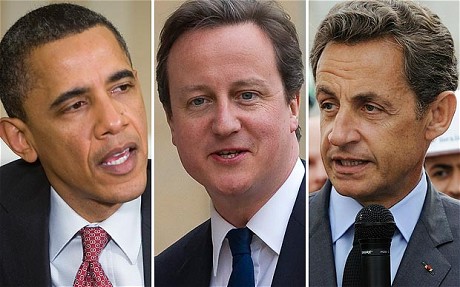
In an extensive interview with The Atlantic magazine published Thursday, President Obama discussed the conditions surrounding the 2011 British and French-led NATO bombing campaign that led to the end of Libyan dictator Muammar Gaddafi’s 41-year-rule.
While the military intervention succeeded in ousting the dictator, the power vacuum it created has seen Libya descend into near-anarchy, ruled by rival militias vying for power while the Islamic State group has gained influence in the country.
Obama believes that while deeper than expected Libyan “tribal divisions” are partly to blame, it was largely the failure of France and the UK to “follow-up” on the bombing campaign that led to the current situation.
“There’s room for criticism because I had more faith in the Europeans, given Libya’s proximity, being invested in the follow-up,” he told the magazine.
Sarkozy wanted to ‘trumpet’ own role
Cameron stopped paying attention soon after the military operation, he said, becoming “distracted by a range of other things”.
Meanwhile, Sarkozy was more interested in promoting the importance of his own role in bringing an end to Gaddafi’s rule, Obama seemed to suggest.
“Sarkozy wanted to trumpet the flights he was taking in the air campaign, despite the fact that we had wiped out all the air defences and essentially set up the entire infrastructure [for the intervention],” the US president said.
Obama rebuked the US’s European and Gulf allies for their habit of waiting for America to take the lead on international issues and therefore of assuming the risks associated with military intervention – what he dubbed “free riders”.
“What has been a habit over the last several decades in these circumstances is people pushing us to act but then showing an unwillingness to put any skin in the game,” he said.
This is why the US pushed for European and Gulf countries to take the lead in Libya, said Obama.
On France, Obama said that by allowing Sarkozy to take credit for the fall of Gaddafi, the US was able to “purchase France’s involvement in a way that made it less expensive for us and less risky for us”.
Obama also told Cameron that Britain needed to “pay [its] fair share” if it wanted to maintain a “special relationship” with the United States by ensuring that at least 2 percent of its GDP is spent on defence, the magazine said.
Syria pull-back ‘right decision’
With such comments unlikely to go down well with Downing Street, the White House moved to defuse the situation by reaffirming Great Britain’s importance as an ally in a subsequent statement sent to the BBC.
“Prime Minister Cameron has been as close a partner as the president has had, and we deeply value the UK’s contributions on our shared national security and foreign policy objectives which reflect our special and essential relationship,” it said.
“With respect to Libya, the president has long said that all of us – including the United States – could have done more in the aftermath of the Libyan intervention.”
Obama’s remarks on Libya came amid a wide-ranging interview with The Atlantic that largely focused on the president’s foreign policy since taking office seven years ago, including his controversial decision not to take direct military action in Syria following President Bashar al-Assad’s use of chemical weapons.
A subsequent deal that saw Assad hand over Syria’s chemical weapon stockpile showed that was the right call, said Obama.
“The fact that I was able to pull back from the immediate pressures and think through in my own mind what was in America’s interest, not only with respect to Syria but also with respect to our democracy, was as tough a decision as I’ve made – and I believe ultimately it was the right decision to make,” he said.
(FRANCE 24 with AFP)

Leave a Reply
You must be logged in to post a comment.